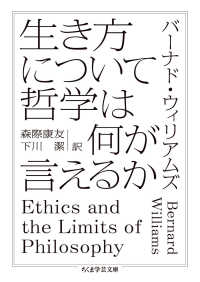Full Description
>CLASSIFY, EXCLUDE, POLICE 'Laurent Fourchard's deep, first-hand knowledge of the history and contemporary politics of Nigeria and South Africa forms the basis of an insightful and compelling analysis of how states produce invidious distinctions among their people and at the same time how political linkages are forged between state and society, elites and subalterns, bureaucratic structures and personal relations.'
Frederick Cooper, Professor of History, New York University, USA
'Violence, control, police and political order are essential dimensions of metropolis. In this exceptional book, Laurent Fourchard compares decentralised exercises of authority in providing vivid analysis of exclusion of youth and migrants, policing and riots, politics of "Big men" and fine-grained blurring between bureaucracy and society. A masterpiece of urban politics.'
Patrick Le Galès, Dean of Urban School, Sciences Po Paris, France
'This book is a major contribution to rethinking urban politics from the experiences of African cities. Based on detailed historical analysis of South Africa and Nigeria, Fourchard recalibrates the actors, stakes and terms of urban politics around African-centred concerns.'
Jennifer Robinson, Professor of Geography, University College London, UK
The cities of South Africa and Nigeria are reputed to be dangerous, teeming with slums, and dominated by the informal economy but we know little about how people are divided up, categorised and policed. Colonial governments assigned rights and punishments, banned categories considered problematic (delinquents, migrants, single women, street vendors) and give non-state organisations the power to police low-income neighbourhoods. Within this enduring legacy, a tangle of petty arrangements has developed to circumvent exclusion to public places and government offices. In this unpredictable urban reality ??? which has eluded all planning ??? individuals and social groups have changed areas of public action through exclusion, violence and negotiation.
In combining historical and ethnographic methods, Classify, Exclude, Police explores the effects and limits of public action, and questions the possibility of comparison between cities often perceived as incommensurable. Focusing on state formation, urbanization, and daily lives, Laurent Fourchard addresses debates and controversies in comparative urban studies, history, political science, and urban anthropology. The book provides a systematic, comparative approach to the practices, processes, arrangements used to create boundaries, direct violence, and produce social, racial, gender, and`generational differences.
Contents
Series Editors' Preface viii
Acknowledgements ix
Classify, Exclude, Police 1
Part I Governing Colonial Urban Space 21
1 Classifying and Excluding Migrants 25
Race and Urban Space 28
Differentiating Urbans from Migrants in South Africa 33
Stabilisation Policies and Urban Residential Rights 34
Reinterpreting the Riots in Sharpeville and Langa 38
Differentiating Natives from Non-Natives in Nigeria 45
The Birth of Territorial Enclaves: Non-Native Neighbourhoods 46
Regionalism and Decolonisation 49
The Kano Riots 52
Conclusion 54
Notes 58
2 The Making of a Delinquent 63
Rise of Urban Poverty and Delinquency Issues 66
Between Psychometric Expertise and Penal Reform in South Africa 68
The Empire's First Social Services in Lagos 71
Race, Gender and Welfare 73
From Preference to Racial Differentiation in South Africa 74
Juvenile Prostitution and the Construction of a Moral Space in Nigeria 77
A Coercive Incomplete Welfare State 81
From Financial Indigence to Flogging in Urban Nigeria 83
Violent Socialisation of Urban Youth in South African Institutions 85
Conclusion 88
Notes 90
Part II Policing the Neighbourhood 95
3 Vigilantism and Violence Under Colonialism and Apartheid 103
Policing in a Colonial Situation: Historiographical Detours 104
Violence and Vigilantism in South African Townships 107
Violence and the Making of Township Communities in the Cape Flats 111
Violence and Vigilantism in South-West Nigeria 117
Honour and Violence in the Centre of Ibadan 120
Conclusion 123
Notes 125
4 Commodification, Politicisation and Uneven Pacification of Contemporary Vigilantism 129
State Regulation and Commodification in Nigeria 133
Commodifying Protection and Regulating Vigilante Violence in Ibadan 135
Return to Democracy and Uneven Pacification of Vigilantism 139
Politicisation, Bureaucratisation and Feminisation of Vigilantism in the Cape Flats 142
Politicisation of Security Initiatives 145
Limited Pacification and Bureaucratisation of Vigilantism 147
Feminisation of Vigilantism 153
Conclusion 157
Notes 159
Part III Politics of the Street, Politics in the Office 165
5 Patronage, Taxation and the Politicisation of Urban Space 171
Patronage and Urban Projects 174
The Amala Politics in Ibadan 176
The Metropolitan Project in Lagos 180
Revenues, Violence and Politicisation in Motor Parks 184
Extorting Money or Levying Taxes? 186
Governing Transport Between Patronage and Bureaucracy 190
Violence, Loyalty and Politicisation in Motor Parks 194
Conclusion 198
Notes 200
6 Bureaucrats, Indigenes and a New Urban Politics of Exclusion 203
Institutionalising Exclusion, Manufacturing New Urban Belonging 207
Producing Certificates, Identifying Urban Ancestry 215
Indigeneity, Segregation and Patronage 223
Conclusion 229
Notes 230
Conclusion: The Urban Legacy of Exclusion, Policing and Violence 233
References 243
Appendix 1: Dictionary 273
Index 279








